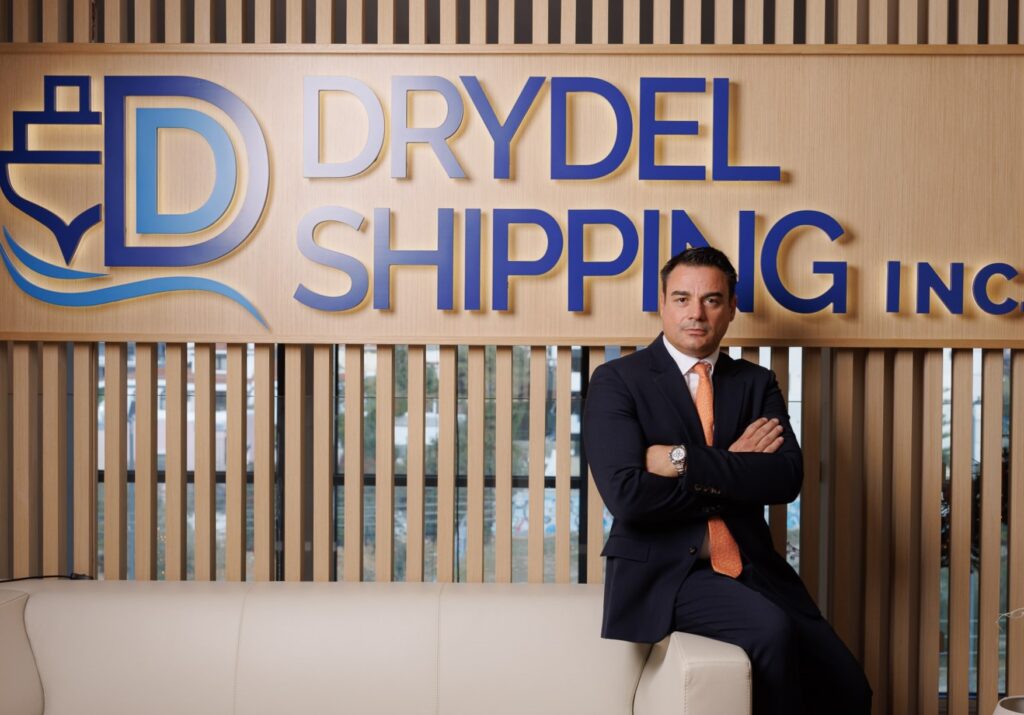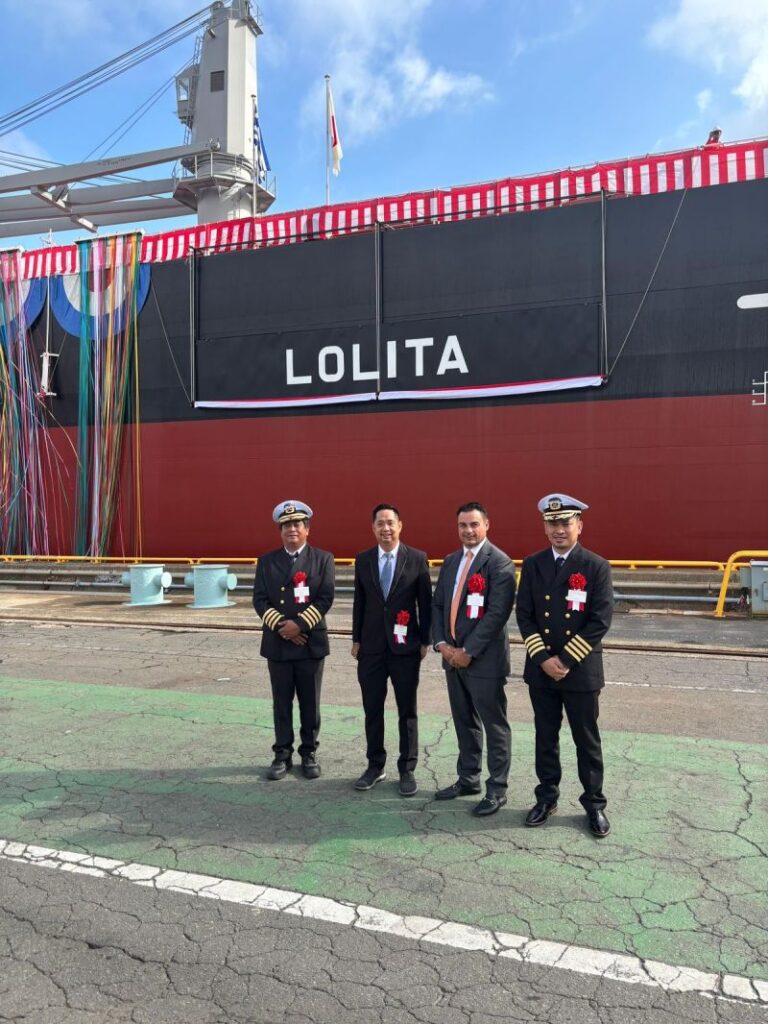DryDel Shipping, a Greek shipowner and operator based in Athens, has decided to enter the Capesize (bulk carrier for iron ore) sector. During his visit to Japan, we interviewed Costas Delaportas, the company’s President and CEO, about the future business strategy of DryDel Shipping.
(Text by Hirofumi Yamamoto)
Photo courtesy=DryDel, Hirofumi Yamamoto

――DryDel plans to address greenhouse gas reduction through its wind resistance reduction technology, “AeroLine,” and by advancing compliance with the upcoming EEDI (Energy Efficiency Design Index) Phase 3 standards for newbuild fuel efficiency, which are set to start in 2025. Has there been any change to this policy?
“This is undoubtedly a pertinent and timely issue. At DryDel, we remain steadfast in our commitment to reducing greenhouse gas emissions through a forward-looking new build program and comprehensive fleet renewal strategy. With an average fleet age of just four years, we aim to further lower this figure.”
“The majority of our newbuild vessels feature the innovative “AeroLine” wind resistance reduction technology, recognized as one of the highest-performing designs in operation today. Moreover, these vessels meet Tier 3 and EEDI Phase 3 standards, offering a 30–40% improvement in fuel efficiency over older ships, resulting in a significant 40% reduction in emissions.”

“While we maintain a degree of flexibility in our strategic approach, our current focus is on conventional fuel electronic engines and cutting-edge ship designs that optimise fuel efficiency. Although we are open to exploring wind technology, alternative fuels, and other advancements, we will only adopt such measures once they are thoroughly tested and proven effective.“
――During the Capital Link panel discussion, Mr. Costas mentioned that he is “considering Capesize bulk carriers.” Could you clarify the intention behind this statement?
“DryDel has earned a strong reputation for its expertise in managing geared dry bulk vessels. As a rapidly growing enterprise, we see immense potential in exploring opportunities across different size segments within the dry bulk sector. This strategy allows us to leverage our existing expertise while diversifying slightly to enhance growth and profitability. ”
“With this approach in mind, we are pleased to confirm an order for two Capesize vessels with Namura Shipbuilding, each boasting a capacity of 182,000 DWT. These advanced ships, slated for delivery in 2028, will incorporate state-of-the-art designs and scrubber technology to ensure optimal performance and fuel efficiency. ”

“The fundamentals of the Capesize market are particularly favorable, with the order book at historically low levels and demand projected to grow, especially in developing economies. By diversifying into this larger vessel class, we position ourselves to capitalize on a promising market outlook, supported by robust relationships with key stakeholders in the Capesize segment.”
――DryDel operates as both an owner and operator. In the current dry bulk market, charter rates remain strong, but new-build prices are soaring. Could you outline DryDel’s future business direction in light of these conditions?
“You are correct; the cost of new builds is rising, and I anticipate this trend will persist.
Since 2020, the global order book has expanded significantly, with Japanese shipyards reportedly booked solid through 2028. This backlog places considerable pressure on labor and materials, driving up costs and, in turn, new-build prices. Consequently, I do not foresee a short-term decline in these costs. “
“While the dry bulk market has shown sustained resilience in recent years, the escalating cost of new builds warrants caution. We believe that modern, eco-efficient vessels will outperform older tonnage, offering a competitive edge and enhanced profitability.”
“Given these conditions, DryDel will focus on renewing long-term time charters with existing clients, ensuring stability in a challenging market environment.”

――Chinese shipyards are continuing to secure orders for new dry bulk vessels. Do you think these new builds from China could negatively impact the dry bulk market in the future?
“It is true that Chinese shipyards still offer slots for dry bulk vessels. However, they have secured far fewer orders in recent years. This is large because Chinese yards have prioritized LNG vessels, tankers, and containerships, which are more lucrative.”
“As a result, fewer yards are willing to construct dry bulk ships, and this shift is unlikely to negatively affect the market.”
――Is there any possibility that DryDel might expand into sectors beyond dry bulk, such as tankers or gas carriers?
“While DryDel’s primary focus remains the dry bulk sector, our management team regularly evaluates other sectors, vessel sizes, and market timing to identify potential opportunities. Although diversification cannot be ruled out entirely, there are no specific plans to announce at this stage. For now, we remain committed to the dry bulk segment, having recently diversified into a larger vessel class. Future developments will depend on the opportunities that arise.”
――As of June this year, DryDel has nine ships on order with Japanese shipyards, all of which are scheduled for delivery over the next three years. The existing fleet includes 13 small to medium-sized bulk carriers owned through Costas Bulk, with an additional 35 similar vessels on long-term charters. Has anything changed regarding this arrangement?
“Since June, DryDel has been highly active in fleet development. We have taken delivery of four newbuild Handysize vessels (40,000 DWT) from Namura Shipbuilding and sold four older ships. ”
“Additionally, we have expanded our order book with four more vessels, including two Capesize ships. ”
“Currently, DryDel owns 13 vessels, with a further 10 on order. Our operating activities include approximately 45 chartered-in vessels, comprising 20 under long-term charters and 25 on short-term agreements. Combined, our existing fleet represents a total capacity of 0.75 million DWT, which will rise by 50% to 1.5 million DWT upon completion of the new build program.”
■Profile
Costas Delaportas specialized in maritime management at London Guildhall University (now London Metropolitan University). After working as a shipbroker, he joined Meadway Shipping, a company managed by his father, Dionysios Dellaportas, in 2000. He served as Managing Director there. In February 2024, Meadway Shipping was rebranded as DryDel Shipping. Currently, he serves as the President and CEO of DryDel Shipping. Born in May 1977, he is 47 years old.

〆インタビュー、ドライデル・シッピング(DryDel Shipping)社長兼CEO コスタス・デラポルタス氏(Costas Delaportas)に聞く、今後の事業戦略
ギリシャ船主兼オペレーター(運航船社)のドライデル・シッピング(本社・アテネ)は、ケープサイズ(鉄鋼原料船)事業への進出を決めた。来日したコスタス・デラポルタス社長兼CEO(最高経営責任者)に今後の同社の事業戦略について聞いた。
(Text by Hirofumi Yamamoto)
Photo courtesy=DryDel, Hirofumi Yamamoto
※日本語記事の続きは日本海事新聞でお読みください。
